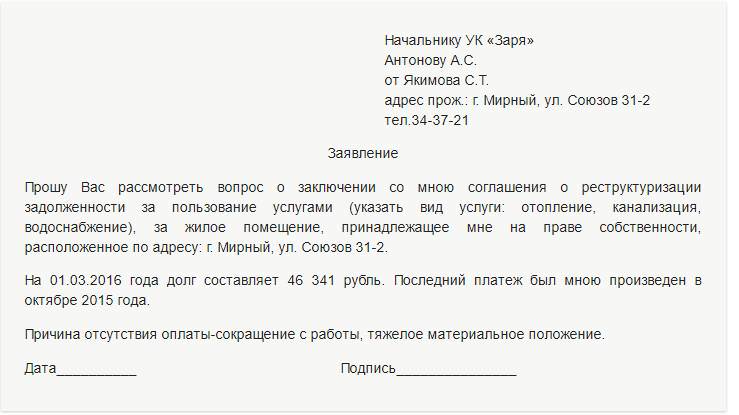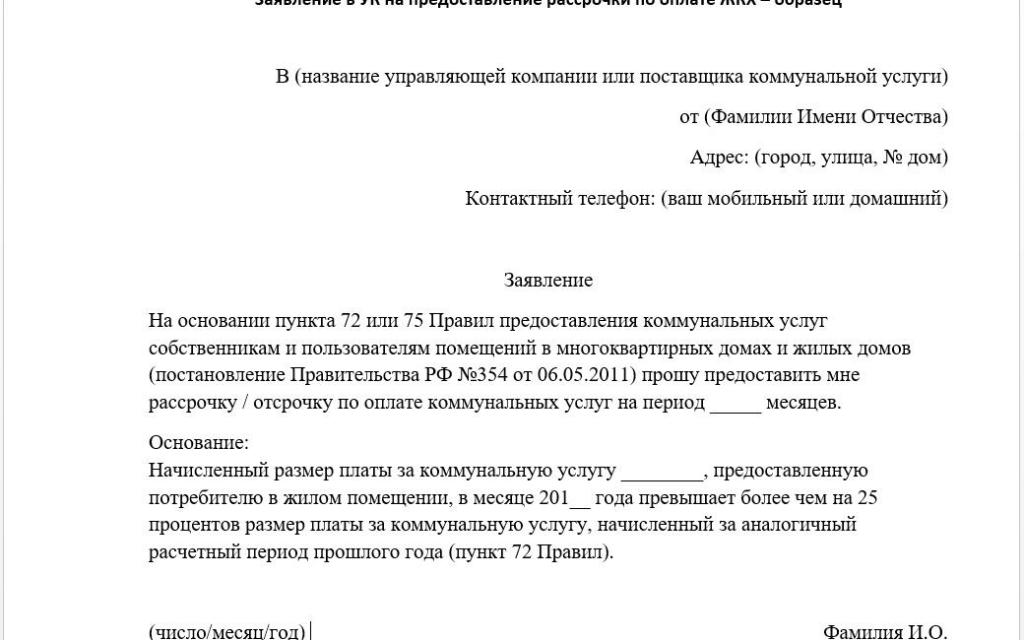Many people face serious financial difficulties, due to which they have debts on loans or for utility bills. If you do not pay monthly funds for utilities, then there are significant debts, which are quite difficult to cope with. Therefore, apartment owners can take advantage of housing restructuring debt. This process involves contacting the insurance company with the appropriate statement. It is important to prove that the lack of funds is due to good reason. If the management company refuses to satisfy the citizen’s request, then such a decision will have to be appealed in court.
Process concept
Debt restructuring for housing and communal services is represented by a special process, which involves amendments to the terms of the contract drawn up between the management company and the owner of a certain premises. Based on these adjustments, the burden on the payer is reduced, therefore, further he can cope with debt and payments on receipts without problems.
Such an opportunity is offered only for people who, for good reason, cannot cope with debt. Usually this is due to the loss of work or disability, so a person simply does not have income. When drawing up a debt restructuring contract for housing and communal services, the material condition of the owner of a particular apartment is taken into account. Additionally, a payment schedule is formed, on the basis of which the debt is repaid. The process is similar to the loan debt restructuring procedure.
The use of restructuring is beneficial for each side, as the homeowner gradually repays the debt, and the utility company receives its installment funds.

Legislative regulation
The rules for depositing funds for housing services are contained in numerous articles of the housing complex. Additionally, relations arising between homeowners and utilities, numerous articles of the Civil Code and the Civil Procedure Code are regulated.
In Art. 446 of the Code of Civil Procedure, it is indicated that it is impossible to evict citizens from an apartment if it is represented by their only housing, even if they have really significant public service debts. The only exception is the situation when housing is purchased at the expense of a mortgage loan that is not repaid by the borrower on the basis of the conditions specified in the loan agreement.
The basis for the process
Debt restructuring for housing and communal services is offered by utilities only if there are good reasons. Therefore, the direct owners or tenants of a particular property must prove that they had good reasons for the appearance of debt. Under such conditions, the employees of the Criminal Code meet the debtors.
The most popular reasons for drawing up an agreement include:
- the dismissal of a citizen from a permanent place of employment in connection with the closure of the company or a reduction, but there will be no good reason if the person leaves his job;
- disability due to injury, registration of a certain disability group or the appearance of a serious disease;
- the appearance in the family of a newborn, which leads to a significant increase in spending;
- death of the breadwinner in the family;
- conscription of a citizen in the army.
Debt restructuring for housing and communal services is often proposed for dysfunctional families in which more than two children are raised. Parents usually do not have a stable and well-paid salary, therefore they cannot pay a significant amount of money every month.The most optimal conditions are offered for them, depending on their income.
Even if there are serious reasons, it is not allowed to unilaterally terminate the obligations of the contract by citizens, which is prescribed in Art. 310 GK. Therefore, utilities do not always make a positive decision at the request of a citizen. If the decision is negative, then it can be appealed, for which a lawsuit is filed in court.

How is the procedure performed?
If debt restructuring is required for housing and communal services, the procedure is performed in several sequential actions. These include the following:
- a statement is being drawn up;
- documents are attached to it, confirming that the citizen has good reason for the formation of a debt;
- pending service decision;
- if it is positive, a restructuring agreement and a payment schedule are drawn up;
- Documents are signed by the tenants of the apartment.
Next, you need to repay the debt based on the documents drawn up.
What documents are needed?
Before properly restructuring the debt of the housing and communal services, it is necessary to prepare documentation for this process. The package of documents can vary significantly in different situations. The following papers are typically required:
- correctly prepared statement on debt restructuring for housing and communal services;
- passport of the direct debtor represented by the owner or tenant of the dwelling;
- if a citizen uses the help of a proxy, then he must have a notarized power of attorney;
- extract from the house book, including data on all persons registered in real estate;
- a certificate of the composition of the debtor's family;
- the last receipt paid in full;
- documentation confirming that the citizen had good reason for the appearance of debts, and this may include a medical certificate, a document from the employment service, a copy of the labor book with a note of reduction or other similar papers;
- 2-NDFL certificate containing information on the citizen’s income, as well as other documents attached to it confirming the receipt of money in the family;
- extract from the USRN, confirming that the debtor is the owner of the housing, if the apartment is privatized;
- if the housing is municipal, then a social loan agreement is prepared.
There is no special application form. It is advisable to use the sample application for debt restructuring for housing and communal services in order to take into account all the nuances in the preparation of this document.

What information is included in the application?
When preparing the application, the following information must be included in the text:
- FULL NAME. and passport details of the applicant;
- the address of his residence, represented by an apartment for which he did not pay utility bills, which led to the formation of a significant debt;
- information about the family members of the applicant;
- list of documents attached to the application;
- details of the company represented by the utility provider;
- the reason for the application, presented by a request to draw up a restructuring agreement on the basis of the existing debt for housing services;
- a request to resolve the conflict in a peaceful way, for which purpose a request is received for installment payment and write-off of accrued fines;
- set the date of the statement;
- the document is signed by the applicant.
Especially much attention is paid to the reason for compiling the document. It must be confirmed by official documents. A sample application for debt restructuring for housing and communal services can be studied below.

Application Methods
A correctly formed application can be transmitted to the public utilities in various ways:
- personal visit to the institution;
- sending an application by mail;
- using proxy help.
It is advisable to do this process yourself.When visiting the Criminal Code, you should have two samples of the application with you, as one is transferred to the organization, and the other is marked with acceptance. Typically, such applications are considered within 30 days, after which the citizen receives a written response. If there really is evidence that the debt was formed for good reasons, then the public service workers will meet, therefore, a restructuring of the housing and communal services debt will be proposed. A sample application can be studied below.

The nuances of drawing up a contract
If the decision of the communal service is positive, then a special contract is drawn up with the owner of the particular apartment to restructure the debt. It necessarily includes the following items:
- details of each party to the agreement;
- total debt for utilities;
- the way in which the debt will be repaid, and usually installments are used for this, which allows you to deposit funds in equal and small monthly payments;
- the period for which installments are granted;
- other nuances of restructuring.
The contract is formed exclusively in the presence of the debtor and the representative of a particular communal organization. Each participant is provided with a copy of the document. The basis for termination of such an agreement is the full repayment of the debt by a citizen. A sample contract for the restructuring of debt for utilities can be studied below.

The consequences of no payments
Companies often go towards debtors, therefore, offer them the opportunity to draw up a contract for the restructuring of housing and communal services debt. A sample of this document allows you to understand what information is best included in the agreement. But often even after its signing, apartment owners do not make payments. Under such conditions, the following actions are performed by the employees of the Criminal Code:
- the debtor is warned about the negative consequences of his decision;
- previously drawn up agreement is terminated;
- for compulsory collection of funds, employees of the organization go to court.
Therefore, before applying for restructuring, you should evaluate your financial capabilities. A citizen can independently indicate for how long it is desirable to draw up an installment plan so that payments are not too high for the family budget. It is optimal for this to choose a period from six months to two years. Often, management companies refuse to provide installments for a long period, therefore they are limited to only one year.

The nuances of going to court
If the Criminal Code refuses to provide an installment plan on its own, then you can file a lawsuit in court to restructure the housing and communal services debt. A sample of a previously filed application with the utility service is invariably attached to this lawsuit. Additionally, the following documents are submitted to the court:
- utility bills;
- statement containing information on the amount of debt;
- certificate of income of a citizen and members of his family;
- official response from the Criminal Code.
If the court agrees that the debtor had good reasons for not paying the receipts, then the communal service will be forced to provide an installment plan. In court, you can demand not only the drafting of this contract, but also the writing off of various fines or even a reduction in debt. In most cases, the court takes the side of the plaintiff, therefore its requirements are fully satisfied.

Benefits of Restructuring
If indeed the owner of a certain apartment is in a difficult financial situation, then for him, drawing up a restructuring agreement is considered the ideal solution to the problem. The advantages of using installments include:
- it is possible to repay a debt with the help of small monthly payments;
- the trial does not begin, with the help of which bailiffs can forcibly recover funds from debtors, moreover, they often use the arrest and confiscation of property at all;
- there is no reason to disable utility services;
- penalties previously charged are debited.
It is advisable to apply for restructuring as early as possible, therefore it is advisable to submit an application immediately after the appearance of certain financial problems with the owner or tenant of the apartment.
Conclusion
Restructuring may be proposed by different management companies, and it is executed on the basis of an application submitted by the direct debtor. It involves amending the main contract. Under the new agreement, installment plans are proposed to pay off the debt.
If the public service refuses restructuring without good reason, then you can appeal the refusal in court.
